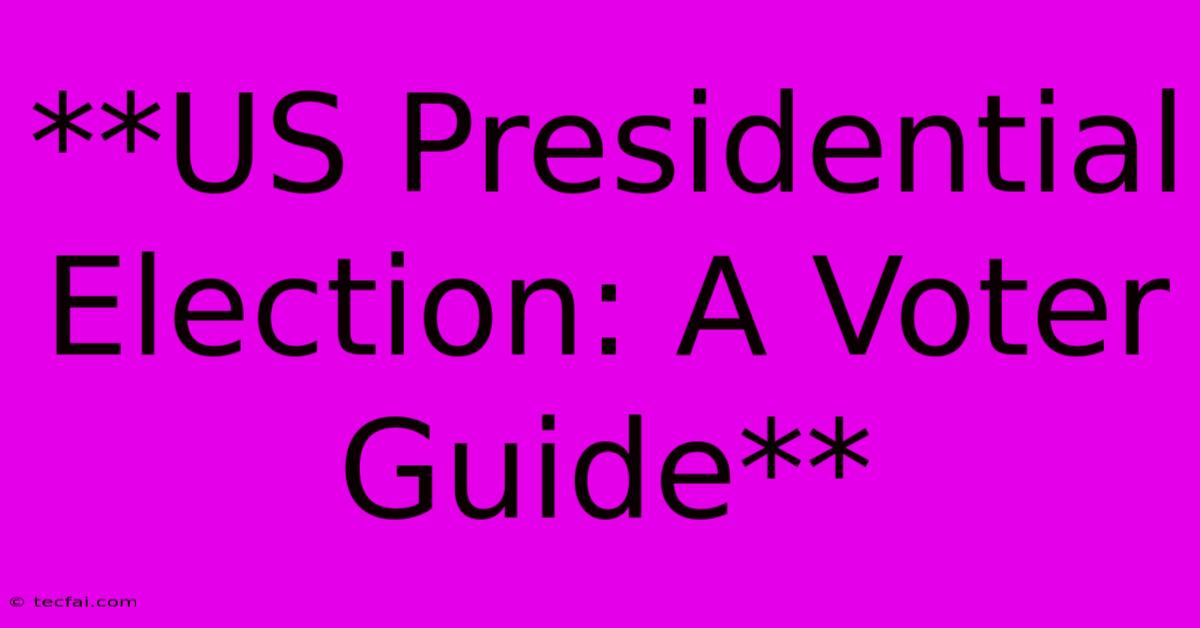**US Presidential Election: A Voter Guide**

Discover more detailed and exciting information on our website. Click the link below to start your adventure: Visit Best Website tecfai.com. Don't miss out!
Table of Contents
US Presidential Election: A Voter Guide
The US Presidential Election is one of the most anticipated and consequential events in the world. Every four years, Americans cast their ballots to choose the leader of their nation, shaping the course of their future. This comprehensive guide provides all the essential information you need to navigate the electoral process and make an informed decision.
Understanding the Election Process
The US Presidential Election is a complex process involving multiple stages:
1. Primary Elections and Caucuses: Each political party holds primary elections and caucuses across the country to select their presidential nominee. These events allow voters to express their preference among various candidates vying for the nomination.
2. National Conventions: After the primaries and caucuses conclude, the two major political parties – Democrats and Republicans – hold their respective national conventions. These conventions formally nominate their presidential and vice-presidential candidates and adopt party platforms.
3. General Election: The general election is held on the first Tuesday after the first Monday in November every four years. Voters cast their ballots for the president and vice-president, choosing from the nominees of various political parties.
4. Electoral College: The US president is not elected directly by popular vote. Instead, the Electoral College system determines the winner. Each state is allocated a certain number of electors based on its population. The candidate who wins the popular vote in a state typically receives all of that state's electoral votes. To be elected president, a candidate must secure at least 270 electoral votes out of 538.
Key Issues in the 2024 Election
The 2024 US Presidential Election is expected to be fiercely contested, with a range of critical issues shaping the debate. Some of the major topics likely to dominate the campaign include:
- The Economy: Economic concerns are always at the forefront of any election. Issues like inflation, unemployment, and economic inequality are likely to be prominent themes.
- Healthcare: The cost and availability of healthcare remain a major source of public concern. The candidates' stances on universal healthcare, access to affordable insurance, and prescription drug costs will be closely scrutinized.
- Climate Change: With mounting evidence of the devastating impacts of climate change, the candidates' policies and plans to address the issue will be a key area of focus.
- Education: The quality and accessibility of education are critical issues for voters. Candidates will likely outline their proposals for improving public schools, increasing affordability of higher education, and preparing students for the workforce.
- Social Justice: Issues related to racial justice, gender equality, LGBTQ+ rights, and immigration will be at the center of the political dialogue. The candidates' stances on these issues will be closely evaluated.
How to Register to Vote and Cast Your Ballot
1. Voter Registration: The first step is to ensure you are registered to vote. Each state has its own registration requirements, including deadlines and eligibility criteria. Check your state's election office website for detailed information.
2. Voting Options: You can vote in person at a polling place or by mail. Many states offer early voting, allowing you to vote in person before Election Day. Absentee voting is also available in most states, allowing you to vote by mail if you are unable to vote in person.
3. Election Day: The general election is held on the first Tuesday after the first Monday in November. Polling places are open for specific hours on Election Day.
Researching Candidates and Issues
To make an informed decision, it's crucial to thoroughly research the candidates and their positions on key issues:
- Candidate Websites: Visit the official websites of each candidate to learn about their biographies, platforms, and policy proposals.
- Fact-Checking Resources: Utilize reputable fact-checking organizations like PolitiFact, FactCheck.org, and Snopes to verify the accuracy of information about candidates and issues.
- Media Coverage: Stay informed by reading reputable news sources and watching news broadcasts. Be aware of potential biases and strive for diverse perspectives.
- Community Resources: Engage in discussions with friends, family, and community members to gain different viewpoints.
Making Your Decision
The choice you make in the US Presidential Election is a personal one. Consider the candidates' positions on issues that matter most to you, their experience and qualifications, and their values and vision for the future. Remember to cast your ballot thoughtfully and contribute to shaping the course of your nation.
This guide provides a foundation for understanding the US Presidential Election process. By staying informed, engaging with the issues, and exercising your right to vote, you can contribute to a more informed and participatory democracy.

Thank you for visiting our website wich cover about **US Presidential Election: A Voter Guide**. We hope the information provided has been useful to you. Feel free to contact us if you have any questions or need further assistance. See you next time and dont miss to bookmark.
Featured Posts
-
November London Tube Strike Dates
Nov 04, 2024
-
Jaguars Vs Eagles Game Predictions
Nov 04, 2024
-
Search For Missing Artist Sarah Cunningham
Nov 04, 2024
-
Voting My Mothers Joyful Legacy
Nov 04, 2024
-
Draisaitl Leads Oilers Past Flames With 3 Points
Nov 04, 2024
